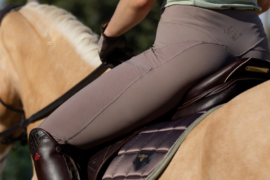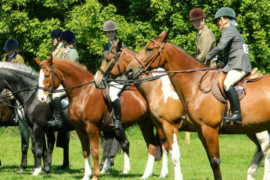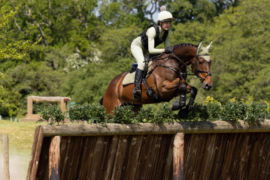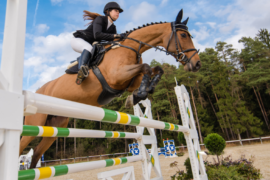Fireworks, love them or hate them they aren’t going anywhere anytime soon. It’s often a worrying and anxious time for owners as well as their horses, ponies and other pets. Leaving out vs keeping in is often the main topic of conversation at many yards as we all want to do what’s best for our much-loved friends. The answer to this question will depend greatly on the horse in question and the facilities of your yard.
Personally, with my horses I’m on team leaving out. My old boy Alfie is steady as a rock and not phased at all by the noise making whiz poppers surrounding the paddock. And my 2-year-old, Fleur, feels safe wherever she is with Alfie. I know if I put her in her stable where she could hear them but not see where the noises were coming from, she wouldn’t be so calm.
There are, however, things we all need to take into consideration during the fireworks season.
Leaving out
Is my paddock safe and secure? If you have decided to keep your horse out, it’s a good idea to check the fencing and that there are no foreign objects that could cause injury. If possible, you could also pop some extra hay out to keep your horse distracted, and unless your horse is extremely brave ensure they have the company of other horses to help them feel the safety from a herd environment.
Keeping in
If you feel your horse would be much safer in a stable environment the same safety checks should be carried out beforehand. You could use stable toys, treat balls and plenty of hay to keep them occupied. Leaving lights on and a radio playing outside their box could help minimize the loud bangs and flashing lights. For some horses, ear plugs (like those used in competition) may be an option (but you’ll need to test these out well in advance).
And in all cases, if coming in at night is out of your horse’s normal routine, starting to bring them in a week or so earlier may also help. Any sudden change in routine can make some horses nervous and have entirely the opposite effect than the one you were hoping for.
The next day
The morning after the display try to keep to your horse’s normal routine but check for any cuts/ injuries. Thoroughly check the paddock and water troughs for any debris that may have come down overnight that could cause harm to your horses or other wildlife who share their field.
Further tips for fireworks
- Equine America’s top tip for fireworks night is ‘to find out when local displays are happening so you can be prepared. Local press and social media are a good place to start. Also speak to your neighbors to ensure they are aware that there are horses nearby and give you the opportunity to put preparations in place.’
- Team up with other owners in your yard. Multiple eyes keeping an eye on the horses can be beneficial for everyone. Make a night of it, bring a flask and some snacks and work out a shift pattern with other owners.
- Stay calm. Horses can pick up on our nervous energy. Remaining chilled out yourself will hopefully encourage your horse to do the same.
- Insurance. It’s wise to make sure you have an up to date third party liability insurance. If your horse does manage to escape, you could be liable for any damage caused.
- Sedation. If you know your horse is likely to be extremely stressed it may be worth booking a vet to talk to you about sedation options.

Should I use a calmer?
If you know your horse could be particularly stressed but don’t want to go down the vet route the addition of a calmer into their feed leading up to fireworks night or a concentrated syringe/cookie could be extremely beneficial for the night of a big display.
Some of our favourites are:
Premier performance calming cookies
Calming cookies can help your horse feel more confident and less anxious. Designed to help your horse think about their actions rather than use their flight mode instincts. They do this by assisting the production of the happy hormone, serotonin, within the horse’s brain.
Please note calming cookies contain molasses. If your horse is sensitive to this ingredient, or has a history of EMS or laminitis, we recommend feeding Premier Performance Calming Powder.
‘Super So Kalm and So Kalm provide nutritional support for the horse in stressful situations, such as fireworks night and may help the horse to maintain a calm outlook.
Super so Kalm powder is designed to be fed daily; we would recommend starting a minimum of 7 days before a planned stressful event such as bonfire night for best results.’
In addition to their daily feed supplement, Equine America also provided a concentrated syringe calmer which can be used 1.5-2 hours before the event. These can be used as a one off, or in combination with the daily supplement.
NAF Magic calmer is a magnesium and herbal based calmer. Magnesium is an essential nutrient to a horse’s wellbeing, and among its many roles is the regulation of nervous tension and relaxed muscles. NAF Magic also contains a unique blend of herbs which when fed in the right combination with magnesium give repeatable, reliable results in reactive horses.
This supplement is available in a powder, more concentrated liquid and an instant magic syringe which can be used like the So Kalm syringe 1.5-2 hours before a known event.
At RB Equestrian we always keep all these calming products, as well as other herbal-based products (such as Global herbs herbal calm, Equimins Serenity Ultra Calm+ and Dodson and Horrell Chamomile) in the store. These can be purchased in store or online via our website (www.rbequestrian.co.uk) and if you are unsure about which calming product is best for your horse one of our members of staff is always happy to advise.
I hope that you have found the tips in this blog useful, the team at RB wish you all and your horses a safe Bonfire Night!








